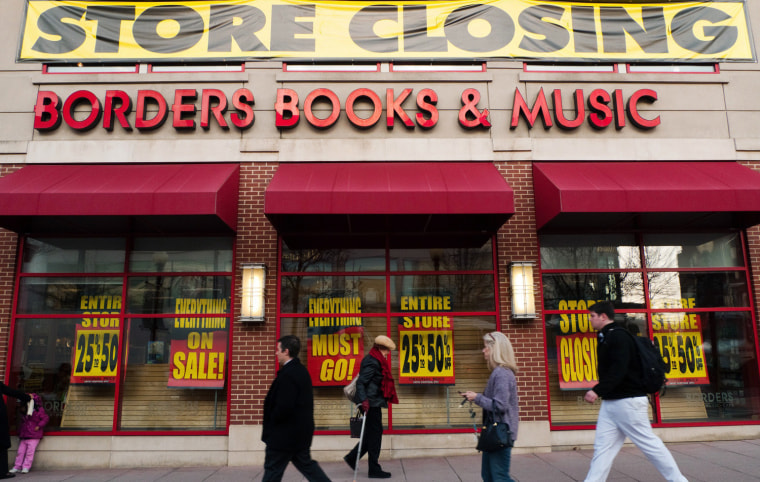Borders, unable to find a buyer willing to get it out of bankruptcy, plans to close its remaining 399 stores and go out of business by the end of September.
“Following the best efforts of all parties, we are saddened by this development,” Borders Group President Mike Edwards said in a written statement late Monday. “We were all working hard towards a different outcome, but the headwinds we have been facing for quite some time, including the rapidly changing book industry, eReader revolution, and turbulent economy, have brought us to where we are now."
The nation's second-largest bookseller, which employs about 10,700 employees, said it will begin liquidating stores as early as Friday. The only two bidders for the company were two liquidation firms, Hilco Merchant Resources and Gordon Brothers Group.
Borders said it would ask the court Thursday to approve the bid by the companies to purchase Borders' assets and administer the liquidation process.
The move came after a bid fell through from private-equity firm Najafi Cos. that could have kept the chain operating. Creditors and landlords said liquidation was a better deal.
Borders Group, which helped pioneer the big-box bookseller concept, once operated more than 1,200 stores, including some under the Waldenbooks name. It was already down to about 600 locations when it filed for bankruptcy protection in February and announced the closure of another 228 stores.
Simba Information senior trade analyst Michael Norris, speaking before the official announcment, said the end of Borders would be a "sad day in book publishing's history and will do severe and lasting damage to the industry's ecosystem."
"There are so many people who buy a small number of books in a given year that the absence of a nearby store that they like can really curb how much they buy," he said. "They won't go to another store or online like flicking a switch."
The disappearance of Borders likely will hurt e-book sales as well, since some e-book readers visit bookstores to see what books they might like to read before buying the electronic version, Norris added.
Owners of the Kobo e-reader will still be able use Kobo software to buy and read books. And Kobo officials said users of Borders e-book accounts, which began transitioning to Kobo in June, will be able to access their e-books uninterrupted.
In addition, the loss of Borders stores will deal a big blow to malls nationwide, according to real estate sources.
Borders' move to close about one-third of its stores earlier this year increased the collective vacancy rate of shopping centers that contained a Borders to 9.3 percent from 4.2 percent, estimated Chris Macke, senior real estate strategist at CoStar Group, the nation's largest provider of real estate data. He calculated the liquidation of the rest of the chain could increase the vacancy rate on that same basis to 18.8 percent. Borders stores average about 25,000 square feet, about half the size of a football field.
While some space vacated by Borders has been filled with stores like Best Buy, Dick's Sporting Goods and Books-A-Million, or broken up to accommodate smaller merchants, leasing has been slow, real estate analysts said. The dumping of 400 stores could further slow any new development of what's known as "power centers," which house supersized stores, says John Bemis, head of Jones Lang LaSalle Inc.'s retail leasing team.
That would hurt the ability to fill them quickly, Bemis added.
Borders Group Inc., based in Ann Arbor, Mich., started with a single store opened by Tom and Louis Borders in 1971. The chain helped pioneer the book superstore concept along with larger rival Barnes & Noble Inc. It was brought down by heightened competition by discounters and online booksellers, as well as the growth in popularity of electronic books.
Kmart Corp. saw the potential and acquired Borders in 1992, forming a book unit with Waldenbooks. It then spun the bookstores off as a separate company in 1995, the same year Amazon started selling books online.
Borders was slow to adapt to the changing industry and lost book, music and video sales to the Internet and other competition. Sales began to fall, leading to a revolving door of CEOs. By the time Borders' current CEO, financier Bennett LeBow, came aboard in May 2010 after investing $25 million in the company, bankruptcy was already looking like a strong possibility.
